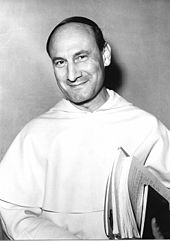Dominique Pire
Dominique Pire (Georges Charles Clement Ghislain Pire) (born February 10, 1910 in Dinant , Belgium , † January 30, 1969 in Leuven ) was a Belgian Dominican , founder of aid organizations and Nobel Peace Prize winner .
life and work
In 1914, with the beginning of World War I , Georges Pire had to flee from Belgium to France before the German troops. The family was only able to return four years later and found their home destroyed. This experience shaped him so that he later campaigned intensively for refugees.
Georges Pire attended a humanistic grammar school and then studied philosophy for two semesters . In 1928 he joined the Dominicans of the La Sarte monastery near Huy and took the religious name Dominique . At the same time, he continued his studies and from 1932 to 1936 he studied theology at the Angelicum University in Rome . In 1934 he was ordained a priest. In 1936 he received his doctorate on "The infiltration of the teaching of the Stoics in Christian writings of the 2nd century", then he studied social and political sciences for another year at the University of Leuven in Belgium. From 1937 to 1947 he taught moral philosophy at the religious school of the La Sarte monastery.
Dominique Pire founded two charitable associations in 1938, which dealt with abandoned children, mostly orphans, living in vulnerable places. These were the Service d'Entraide Familiale ("Family Support Service ") and the Stations des Pleins Air de Huy as outdoor aid stations in the "good air of Huy". The latter took in children from bomb-prone areas in Belgium and France, especially during World War II . During the Second World War he took part in the resistance himself and smuggled Allied pilots out of the country. Sometimes he also worked for the secret service .
In 1949 he founded the organization Aide aux Personnes Déplacées ("Help for homeless people"), which had the goal of moral and financial help for displaced persons (DPs). In this way, he mainly organized material aid for around 60,000 people who had been deported from their home countries or were otherwise homeless and who lived in DP camps in Austria. He also organized the sponsorship movement , in which around 15,000 homeless children were adopted by Western European families.
Between 1950 and 1954 he founded four homes for old refugees in Belgium: in Huy (1950), Esneux (1951), Aertslaer (1953) and Braine-le-Comte (1954).
Between 1955 and 1962 he organized the creation of the so-called European villages in Germany , Austria and Belgium. The first village was built in 1956 near Aachen , another in the same year in Bregenz on Lake Constance and a third in 1957 in Augsburg . By 1962, seven European villages were created in this way. In 1958, Pire was awarded the Nobel Peace Prize for helping the refugees for this activity .
His best-known aid organization is L'Europe du Coeur au Service du Monde (“Europe's Heart for World Aid”), which he founded in 1959 and whose main aim is to overcome cultural differences. A year later he also founded the Mahatma Gandhi International Peace Center , which was to serve as a "Peace University" for improving global understanding and which still exists today. In 1962 he also founded the first Peace Island in eastern Pakistan , followed by another in India in 1967 .
Dominique Pire died at the age of only 58 after complications from an operation. In addition to the Nobel Peace Prize, he received numerous other awards, including the Sonning Prize . In addition, after the Second World War he was awarded the French Resistance Medal , the French War Cross and the Great Federal Cross of Merit of the German government and was a knight of the French Legion of Honor. In 1987 the asteroid (3228) Pire was named after him.
literature
- Hugues Vehenne: Fr. Dominique Pire - Memories and Conversations. From the French by Roswitha Plancherel. Benziger Verlag, Einsiedeln 1960.
- Bernhard Kupfer: Lexicon of Nobel Prize Winners. Patmos Verlag, Düsseldorf 2001, ISBN 3-491-72451-1 .
- Guido van Damme: Dominique Pire. Nobel Peace Prize Laureate. Translated from the French by Marcel Oswald. St. Benno Verlag, Leipzig 2010, ISBN 978-3-7462-2924-9 .
- Dominique G. Pire , in: Internationales Biographisches Archiv 12/1969 of March 10, 1969, in the Munzinger archive ( beginning of article freely accessible)
Individual evidence
- ↑ a b http://www.nobelprize.org/nobel_prizes/peace/laureates/1958/pire-bio.html
- ↑ Minor Planet Circ. 12209
Web links
- Information from the Nobel Foundation on the 1958 award ceremony for Dominique Pire
- Literature by and about Dominique Pire in the catalog of the German National Library
| personal data | |
|---|---|
| SURNAME | Pire, Dominique |
| ALTERNATIVE NAMES | Pire, Georges Charles Clement Ghislain |
| BRIEF DESCRIPTION | Belgian monk and Nobel Peace Prize laureate |
| DATE OF BIRTH | February 10, 1910 |
| PLACE OF BIRTH | Dinant , Belgium |
| DATE OF DEATH | January 30, 1969 |
| Place of death | Lions |

